Sharing the Dharma with Children and Families
Written by: Shin'yu Vitells
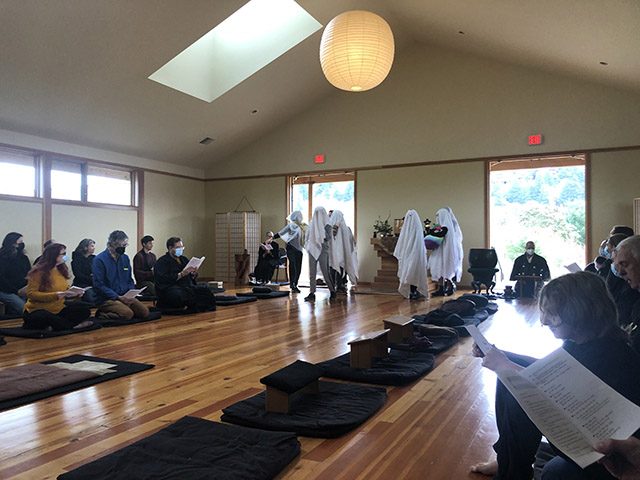
Dharma School students dressed as hungry ghosts enter the zendo during the Sejiki Festival.
Photos by: Dharma Rain, Veronica Roderick
Dharma Rain Zen Center’s program for children and their families is developing new and creative approaches, reflecting people’s changed experience coming out of the Covid pandemic.
Coming together in person again after a two-year hiatus, we saw that we needed to meet the needs of our youth, and the needs of families, as they emerge from the challenges and isolation of the pandemic years. Everyone needs to come together, to be seen and heard, and to feel they belong to a community.
The two-year separation was hard, but it allowed us to see our program with new eyes, rather than follow a model we had been using for many years.
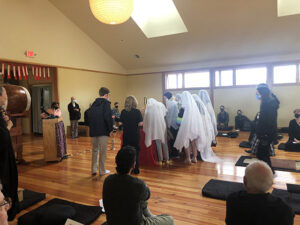
Hungry ghosts crowd around the Sejiki altar.
Dharma School resumes connecting people
We cautiously re-opened Dharma School on April 3, 2022. Eleven students and four adults gathered in the “Barn,” a large Quonset hut that serves as Dharma Rain’s workshop. Rugs had been spread out on the floor, an altar had been created amongst the table saws and wood scraps. The large overhead door was open for ventilation.
From the start, it was obvious there was a need to connect on a deep level. “It had the feel of a secret club house,” said Molly Bailen, one of the teachers. “We had some amazing discussions on topics like the nature of self, and the nature of experience. Seeing the kids socialize and be happy was good for the heart, after being isolated for so long.”
What we learned from Dharma School in the Barn has informed our thinking about what’s important for our youth and families now, in these post-Covid times. Our focus has been on re-connecting, learning to reach out, to be open. There’s a need to practice skillful speech and compassionate listening, after our years of isolation. We saw that our students need a sense of belonging, a sense of community. Our theme for the fall was “Sangha and Community of Practice: Bringing Us Back Together.”
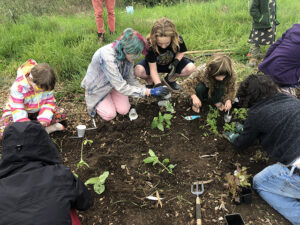
Cupid Amelia Hale and Max Mishaga help students planting seedlings.
We’ve also tried to create opportunities for young people to connect and to share their experiences, in a relaxed and informal way. There have been lessons on journaling, non-violent communication, yoga and breathing exercises, different forms of artistic expression, as well as specific Buddhist teachings like the Bodhisattva precepts.
The teens recently had their first overnight in the zendo since Covid, and they made dinner in the temple kitchen and played games in the zendo. But there was also time for more serious practice in the form of a fusatsu ceremony. Fusatsu is generally considered a ceremony of confession or atonement, but in Dharma School we use it as a time to share what is deepest and most heartfelt at that moment.
We wondered how we would combine the playful and fairly wild energy of the overnight with an introspective practice like fusatsu, but we needn’t have worried. The kids participated willingly and wholeheartedly. There seemed to be recognition that this was something we all needed.
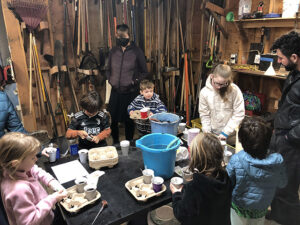
Anne Harper and Thomas Albanese help their students plant seeds.
Supporting parents in the dharma
We also have new understanding of the importance of home practice for families, and we’ve put new effort into supporting parents. They are, after all, the primary spiritual guides for their children for many years.
This understanding comes in large part from Flying Fish Murphy, a priest from Clouds in Water Zen Center in St. Paul, Minnesota. Murphy moved to Portland a few years ago.
“We only have the children for 1 ½ hours every two weeks,” Murphy said. “It’s our job to support families in the dharma practices they are doing at home, which help them raise confident, loving, caring and happy young adults.”
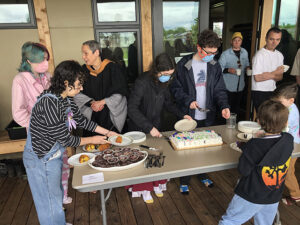
Teens serving birthday cake at Wesak.
In our parents’ group, the question that most often comes up is, “How can we practice at home, when the family needs so much attention?” We’re learning to see that raising children is a Dharma gate for parents, not something that gets in the way.
Setting up an altar, for example, can be a family endeavor. Family members can decide if they would like an altar and why. It’s important to recognize that each member of the family may think of the altar differently: as a sacred space, a simple quiet corner, or a place of refuge.
The space that’s created may be a place to meditate or to do devotional practice. It may be a place to enjoy a few moments of solitude in the midst of busy family life, or a place to come together as a family. It might become a place to leave a favorite toy when a child goes off to school, to say a prayer for a sick dog, or to take a breath and center before leaving for work.
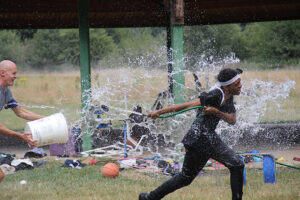
Water fight at Dharma Camp.
Often people come to Buddhist centers as young adults, at a time of life when they are looking for meaning in their lives. When they have children, they may no longer have time to attend group meditation or other events, and they may not return to active participation until their children are old enough to be left on their own. Therefore we’ve started wondering what we can offer people at the parenting stage of their lives, to support their practice as parents, not in spite of being parents.
Here are some things we’re trying: a parents’ retreat, a family day that includes lots of games, crafts, and delicious food; and an open zendo where parents and kids can come and sit as they wish. We’re even trying weekly meditation for parents with babies.
Dharma Rain has been sharing the dharma with children and families for nearly 40 years. Volunteer teachers lead four or five groups designated by age, plus a parents’ group, throughout the school year. For many of our kids, a one-week overnight summer camp is the highlight of the year.
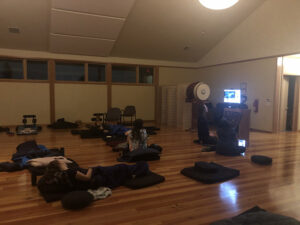
Dharma School overnight in the zendo.
For many of the years that we offered Dharma School, we cycled through six themes: the Buddha’s life, bodhisattvas (enlightened beings), the paramitas (wholesome qualities that we work to embody), the six realms of existence, and the precepts or ethical guidelines. Our goal has not been to ensure that our youth have a particular knowledge base. The intention has always been to expose them to Buddhist teaching so they can recognize values such as simplicity, acceptance, kindness and taking care of others, so these values can support them as they mature. We hope they absorb some understanding about how one can deal with suffering.
This year, to create a sense of place and community we’ve been outdoors a lot, exploring the temple grounds, planting lettuce and spinach seeds that will yield a delicious salad in a few months, visiting the chickens and ducks. Sangha members have met with our students to talk about ceremonial roles in the zendo, what it’s like to be a resident, or a monk. Our aim has been to help our youth become familiar with temple life, so they can understand that they are an important part of this sangha.
We’re also looking for new ways to bring our families and adult sangha together, like community lunches, coming together to chant at the end of Dharma School, and new ways to participate in ceremonies together. It’s our intention to make our family programs more visible to the adult sangha, so the importance of youth and family practice is more widely appreciated and supported. This is work that nourishes the heart; we see it bear fruit.
Shin’yu Vitells is a Zen Buddhist monastic and transmitted teacher at Dharma Rain Zen Center. She oversees Dharma Rain’s programs for children and families: Dharma School, Dharma Camp, and Frog Song Montessori Preschool. She also serves the Rose Villa Sangha, at Rose Villa Retirement Community in Portland.
